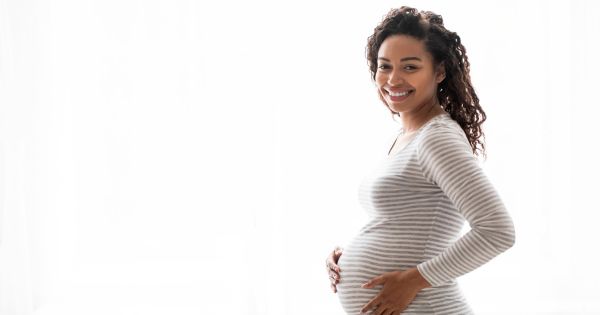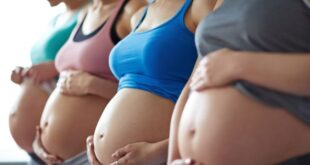Your hair generally goes through three growing stages namely, active growth, resting and shedding. Individuals typically shed one hundred hairs during a day. But when you are pregnant, and your hormones are all over the place your hair cycle will undergo a change.

Hair becoming thicker during pregnancy
During pregnancy, hair tends not to shed and remain on your head, that’s why your hair appears to be thicker and longer than usual. Some research proposes that your hair strands can thicken when you’re pregnant (the diameter increases). Every person has a natural hair cycle. Your hair grows, rests for two to three months and are then pushed out by new hair growing in the follicles. During pregnancy, some women will notice their hair feeling thicker around fifteen weeks. This is because less hair falls out due to the rise in oestrogen hormone levels.
Hair becoming thinner during pregnancy
Some women may notice that their hair is falling out more than usual during pregnancy. This happens due to a decrease in oestrogen hormone levels which may happen as a result of:
- Stopped taking the contraceptive pill
- Experienced miscarriage, abortion or stillbirth
- Hormonal imbalance during your pregnancy
Women commonly experience hair loss after giving birth when their oestrogen levels return to normal. This results in extra hair from the growth phase changing to the resting phase. Hair falls our more than usual and will continue until about three or four months after delivery. This is a normal occurrence and no reason for concern. Growth patterns will only return to usual round about the time your baby is twelve months old. Hormones alter the shape of hair follicles during pregnancy therefore it is not unusual for women to have hair that becomes less or more curlier during this time. Ultimately, the shape of the hair follicle will determine the shape of the hair fiber.
Is it safe to dye your hair when you are expecting?
It is commonplace for women to have hair pregnancy concerns, particularly when it comes to using chemicals that may be harmful to their unborn child. If you normally perm, relax, highlight or dye your hair, you may be wondering whether you should be taking a break during pregnancy. Some physicians will give the go ahead while others recommend stopping. Most doctors, however, will recommend avoiding any hair treatments during your first trimester. Few studies have been conducted to examine the effects that dyes, or other treatments may have on an unborn child and pregnant women. But there is always a concern that the toxic chemicals may be absorbed through the many pores on the scalp and somehow be passed to your growing foetus. There may always be a probability, particularly with a scalp that is irritated. The general rule applies that whenever you’re unsure, rather steer clear until you’ve consulted with your doctor or gynaecologist.
Read Also: Is It Safe To Take Collagen While Pregnant And Breastfeeding?
Is it safe to colour your hair when breastfeeding?
It is said that the chemicals in hair dye won’t enter your milk supply, therefore not harm your baby. Since your new-born will be taking up a lot of your time, it may be useful to ask your stylist to simplify your hairstyle or colour to make it easier for you and keep it low maintenance. If you still have dwindling concerns about dying your hair when breastfeeding, then there are alternative options you can try to make it safer. You could get highlights or low-lights which require less chemicals than a full colour or you can dye with a vegetable dye such as Henna. When you’re dying at home, choose an ammonia-free formula and avoid dying your hair in the same room as your baby.
Other tips for minimising your exposure to hair dye chemicals:
- Always wear gloves when dying your hair yourself.
- Don’t leave the formula in for longer than the prescribed time.
- Always colour your hair in a well-ventilated room.
- Stick to the instructions.
- Make sure you’re rinsing your scalp properly afterwards.
- Refrain from mixing different hair colour products.
- Do an allergy patch test before dying your hair.
- Be cautious when using other chemical treatments such as straighteners as they may contain formaldehyde which is a known carcinogen.

All you need to know about postpartum hair loss
It is common for women to lose large clumps of hair after giving birth. The hair on our bodies grows in a cycle lasting anything from two to seven years. The active growing stage of a hair strand is referred to as anagen and this determines the length of our hair. After time, the hair follicles go through a transitional stage, referred to as catagen before entering the telogen (resting) stage. Shedding happens and then the process starts again from scratch. Hormonal changes before, during and after pregnancy can affect the growth of your hair. One of the symptoms after giving birth is hair loss (telogen effluvium). The condition, also known as postpartum alopecia, affects between forty and fifty of women during the months after giving birth. The amount of hair loss will vary from woman to woman. However, the hair loss may seem more predominant in women with longer hair.
How can one prevent postpartum hair loss?
You can prevent postpartum alopecia by maintaining both a healthy lifestyle a body during the weeks and months after giving birth.
- Ensuring that you are doing steady exercising ranging from gentle to moderate.
- Sticking to a healthy diet which is rich in nutrients that supports body changes and assisting with postpartum recovery.
- Taking postpartum minerals and vitamins if recommended by your physician.
You can also try taking collagen supplements, check out Beauty Greens Peptan Collagen reviews.
Typically, the condition will correct itself as soon as your hormone levels are returning to normal. Try not to stress too much about temporary hair loss as this is something that typically happens when you’re recovering from childbirth.
 Kaboutjie SA Mommy Blogs by Lynne Huysamen
Kaboutjie SA Mommy Blogs by Lynne Huysamen





Lynne,
It’s so funny that I have three kids but did not experience the hair loss until the third one. I had no clue that I could lose so much hair and still not be bald LOL. My husband said I could make a small dog from the hair I was losing each day. Our bodies go through so much change during pregnancy, it’s amazing how much women change and adapt when pregnant and after birth. We are amazing creatures!
Strangely enoughh my hair looked quite dull during my pregnancy but my skin glowed! Only afterwards it’s healthy again and I noticed a slight different colour in my hair a reddish tint. I always had the tint but its more prominent 🙂 the body really changes alot with pregnancy!
Loads of great information on here, thank you so much! I battled for a long time after having my children with my hair falling out.
I remember being a textbook case during my pregnancy–putting on the right amount of weight every month, exercising, sticking to a strictly healthy diet, etc., Lynne! Also, yes, I cut my hair real short to make it easy to manage (and also dunk it under the tap because it was ridiculously warm weather in Mumbai). And of course, I thought it looked great on me. 😉
Fortunately, no hair loss during pregnancy or after. I took good care of it. My son loved to grab my hair or my glasses — what lovely times! And now, decades later, my diabetes is making me lose hair like nobody’s business. Sigh. I’ve never colored my hair (too lazy to keep up with it). I do recall my doc telling me to avoid hair color and stuff during my pregnancy–I have super sensitive skin. But my friend did indulge in all kinds of shades and she was fine. Our body is so amazing! A healthy lifestyle takes care of most things!
I always have big clumps of hair falling of my head (and yet I still have a nice set of hair remaining) but when I was pregnant, not one single hair fall of my head. It was such a nice change. But as soon as I gave birth it went back to falling.
This is absolutely fascinating! I never knew that pregnancy affects our hair so much. I just generally battle with my hair falling out, so would be interested to see what the hormonal change would do.
Thank you for this article, I am currently struggling with postpartum hair loss and I needed the reassurance that it ws normal.